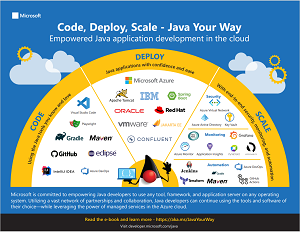News
Microsoft Launches New Resource for Java Developers
Microsoft launched a resource web page for Java developers, described as a one-stop shop for tools and resources that enable Java jocks to productively code, deploy and scale their apps.
It's an expansion of continued investments in the Java developer experience and ecosystem from Microsoft, which on its site for the Microsoft Build of OpenJDK proclaims "We use more Java than one can imagine" across properties including Azure, Minecraft, SQL Server, Visual Studio Code, LinkedIn and more.
According to a spokesperson, the new Java at Microsoft web page features:
- Resources including documentation, videos and samples that help Java developers build and scale efficiently on Microsoft Azure or any other OS.
- A PDF that outlines how to code, deploy and scale Java development, empowering developers to use any tool, framework and application server on any OS.
- A second paper that illustrates best practices from Microsoft on how the company itself uses Java, including significant parts of its business.
Regarding the best practices listed in that latter bullet point above, the site, for one example, can lead developers to FastTrack for Azure, which even targets ISVs and startups specifically with technical guidance and best practices to build apps on Azure in a custom program.
 [Click on image for larger view.] Java E-book Infographic (source: Microsoft).
[Click on image for larger view.] Java E-book Infographic (source: Microsoft).
Another offering on the site, the "Code, Deploy, and Scale Java Your Way" e-book (bullet point No. 2 above), promises to help readers:
- Continue writing code using the Java tools and frameworks they already know and love.
- Deploy their Java applications using their preferred application servers and open source software.
- Scale their Java applications easily and confidently including necessities such as security, supporting data and messaging services, caching, monitoring and automation.
"Many people are surprised to learn that we're using Java to run significant parts of Microsoft--and empower thousands of customers to do the same," said Microsoft's Julia Liuson in an Aug. 30 blog post on the company's Tech Community site titled "Microsoft is committed to the success of Java developers."
"Specifically, Bing -- Microsoft's web search engine, which also powers the search feature in the Windows Start menu -- uses Java to perform indexing-related functions," Liuson continued. "Beyond Bing, Azure's infrastructure control plane, and other divisions such as LinkedIn, Minecraft and Yammer use Java extensively. We have deployed over 2 million JVMs for our internal systems and business needs.
"We actively support Java community organizations to invest in and help promote the future of Java. We contribute to OpenJDK, and Eclipse Adoptium, Jakarta EE and MicroProfile in the Eclipse Foundation; we are also a member of the Java Community Process."
That sounds like they use more Java than one can imagine.
About the Author
David Ramel is an editor and writer at Converge 360.